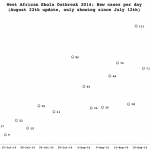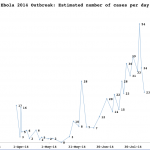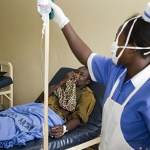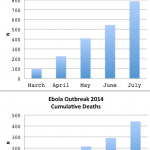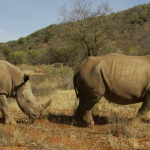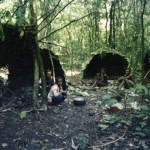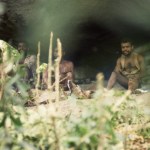Africa
The number of people known or suspected to be infected with Ebola in the West African outbreak is increasing, and the rate at which it is increasing is increasing. About 40 new cases are being reported per day on average, but the number of new cases has been going up by a few a day.
However, it is still unclear that these numbers represent what is actually happening on the ground. There is little confidence that the WHO has a good idea of who is currently stricken with the disease, and efforts to contain those who are have had mixed results.
A second outbreak is now occurring in the DR…
New for August 16th
I will try to keep new information and updates in the same post for a while until I have a chance to do a comprehensive re-overview of everything.
The 16 August update from WHO indicates a large uptick in the daily number of cases. Over the two days of the most recent reporting period an average of 76 cases per day have been identified as confirmed, probable, or suspect, with a total of 76 deaths over that period of time.
Good news is that the situation in Nigeria doesn't seem to be developing. There were no new cases over the this reporting period, and one death.…
The WHO came out with a new report today with the latest figures on Ebola. These numbers take us to the end of July. There are two bits of bad news.
First, the number of new cases is high, as high as any prior report (but keep in mind that these reports cover uneven time periods). There are 163 new cases and 61 new deaths, bringing the total number of confirmed cases and deaths to 1009 and 574, with the total number of confirmed, probable, and suspected to 1,603 cases and 887 deaths.
Second, Nigeria is now in the mix. There was previously only one case in Nigeria, a Liberian man who…
LATEST UPDATE HERE
It is true that this particular outbreak of Ebola has taken health officials somewhat by surprise. It is impossible to know, but I suspect that if you had asked a few ebola experts, a year ago, if there could be an epidemic that would spread across three or four countries, infect a couple thousand people, and last with no sign of letting up for a few months (that is the current situation, more or less), most would say no, probably not, though it is within the range of possibilities. Does the fact (assuming it is true) that this particular Ebola outbreak is unprecedented…
LATEST UPDATE HERE
UPDATE: The latest numbers do not indicate a weakening of the outbreak. (See list of new cases below. Several graphs have been updated as well)
UPDATE: More detailed discussion of transmission of Ebola
UPDATE: I note with sadness the death of my neighbor (though I did not know him) of Patrick Sawyer, of the Liberian Ministry of Finance, who died in Nigeria of Ebola contracted in Liberia. He was on his way home to Minnesota at the time.
There is an Ebola Outbreak currently underway in several West African countries, mainly Sierra Leone, Liberia, and Guinea. This is the…
John Abraham has an interesting post up at the guardian called "Global warming action: good or bad for the poor?" It is a response to a post by a group of guys who tend to write annoying stuff about climate change (you can go to John's post for that information). Here, I want to make a brief comment related to John's excellent post.
The crux of John Abraham's post is this, in two parts: 1) Some have argued that mitigation against climate change is bad for "the poor" (read: people in developing countries) because they have a right to go through the same phases of technological and social…
UPDATE (March 27 2015): US gives Texan rhino hunter an import permit
A Texan who won an auction to shoot an endangered black rhino in Namibia has been given a US permit to import the trophy if he kills one.
The US Fish and Wildlife Service said hunting an old rhino bull helps to increase the population.
There was an outcry when Corey Knowlton won the auction last year, with animal rights activists decrying it. It's not yet clear when the hunt will happen.
Namibia is home to some 1,500 black rhino, a third of the world's total.
The US agency issuing the permit said that importing the carcass…
Imagine going back in time to visit Nelson Mandela in prison and telling him this: "You will live through this and be free, you'll lead your country and set an unattainable example of leadership, you'll retire as president and die at a very old age. The violence associated with the end of Apartheid will be so little it will be mostly forgotten. There will be truth. And reconciliation." That would have been a remarkable, impossible prediction at the time, because he was clearly destine to die in prison, and there was little possibility of reconciliation and there was every chance of…
Student guest post by Carrie Ellsworth
During the summer of 2010 I spent two months in Ghana studying a parasite called schistosomiasis. We worked in a small town called Adasawase to determine prevalence and treat the schoolchildren who were infected. We were told that schistosomiasis was not a major health concern for the people in the town because they were often faced with other diseases that had more immediate and severe health consequences than a parasitic infection. It became apparent that if we wanted the people of this small town to take this health threat seriously, we needed to…
“First, we’re going to collect our data,” Jack, the archaeologist, was telling me as we slogged down the narrow overgrown path. He seemed annoyed. “Then, we’ll leave. Until we leave, they won’t leave. They think it would be rude. After they leave, we’ll go back and map in the abandoned camp.”
I had just arrived at the research camp in the Ituri Forest, then Zaire and now the Congo, after a rather long and harrowing journey that took me from Boston to New York to London to Lagos to Kinshasa to Kisingani to Isiro, all by plane, then over 250 kilometers of increasingly less road-like road, to…
At the beginning of the 20th century, a traveler in Central Africa made mention of some strange people that he had come across. He was traveling among regular, run-of-the-mill natives…probably Bantu-speaking people living in scattered villages and farming for their food. But along the way, strange people came out of the forest. These strange people had sloping foreheads; they were short of stature, bow-legged and otherwise misshapen. They also clearly were, in the eyes of the traveler, of subhuman intelligence. The traveler described these people as a separate, subhuman race that lived in the…
We were talking about River Blindness.
Trigger Warning: The video below is not for general consumption. Having said that you may want to watch it. The first part depicts the reactions of a handful of celebrities watching a series of shots depicting seven different related tropical diseases, and I must say, having seen all of these diseases in person (and having treated some of them, and had mild versions of a couple myself) that these particular videos show the worst side of it. But still, a very large number of people (according to the source of the video, about a billion) have some form…
I first became aware of, and read, King Leopold's Soliloquy, which is not his soliloquy but a parody of what he might say according to Samuel Clemens, while doing fieldwork in the ex-Belgian Congo. That is where the real story that inspired the essay took place. I lived in an area that at one time had a few a plantations, but the plantations only existed briefly and are now long gone. The "road" through this area was passable only with a very tenacious four wheel drive vehicle (we had a Land Rover) and grew worse every year. But the road at one time was excellent.
I knew a guy, an older…
River blindness, also called Onchocerciasis, is the result of the infection of several different eye tissues by the nematode Onchocerca volvulus. The bacterium Wolbachia pipientis lives symbiotically in the gut of the nematode, and escapes the small roundworm to cause an inflammatory response in human tissues, which results in damage to the tissue. These infections can occur in a number of different human tissues causing a variety of effects, but when the eye tissues are involved, the result can be river blindness. It is endemic and widespread in several areas of Africa, as well as more…
I knew a couple who had spent a lot of time in the Congo in the 1950s. He was doing primatology, and she was the wife of the primatologist. And when she spoke of the Congo or Uganda, where they spent most of the time, she always said "The thing about Africa is that there's no place to sit down."
Now, I've been all over Africa, and I've sat down in Nigeria, Kenya, Lesotho, Botswana. I admit having had a hard time finding a place to sit down in Namibia but that's because I've only been in places with no chairs but there were a lot of rocks. I once sat for a long time on a curb in Rwanda.…
People who do a lot of field work end up with interesting stories to tell, especially if the fieldwork is diverse and the conditions are adverse. Often, the sort of thing people want to know about is very different from the repertoire of available stories, but as long as the expectations of the audience is not too rigid, experienced fieldworkers in the various sciences that do field work make the best cocktail party extras.
I never met Jon Kalb, but we have a lot of colleagues in common. I first heard of him as one of the scientists on the same expedition that found the famous fossil "Lucy…
The Tech Awards, presented by Applied Materials, honors individuals, non-profit organizations and for-profit companies who are using technology to significantly improve human conditions in 6 awards categories.
The technology used can be either a new invention or an innovative use of an existing technology.
NBC will be livestreaming the awards ceremony tonight from the Santa Clara Convention center.
http://www.nbcbayarea.com/on-air/as-seen-on/The-Tech-Awards-2012-177952…
This year's categories are: Environment, Education, Young Innovator, Health, Economic Development, and Sustainable Energy.…
Check it out:
Thank you Sarah!
Here's the Sungudogo Page in case you want to experience the pain of reading it too! (I mean the good kind of pain, of course.)
...Sungudogo is a little known zoological mystery, an “undiscovered” primate living in the remote and rugged region of the eastern Congo, where the Central African Rain Forest fringes the high walls of the western edge of the Great Rift Valley.
Sometimes called the “fourth African ape,” Sungudogo is not a Gorilla, not a Chimpanzee, not a Bonobo, and possibly not even real.
Years ago, Sungudogo drew the interest of the world famous primatologist Dieter Phillips, who was funded by a secret society of “scholars and gentlemen” to launch an expedition to determine the veracity of this mysterious…
Rabies is a disease without a public relations firm. In developed countries, human disease is incredibly rare--we see typically one or two deaths from rabies each year. In contrast, lightning is responsible for about 60 deaths each year. However, worldwide, rabies is another matter. Today is World Rabies Day, a reminder that 55,000 people still succumb to this virus every year--most of them in impoverished regions of Africa and Asia. While cases in the U.S. are typically due to wildlife exposure (rabid bats or even beavers or rabid kitten), infected dogs remain the main vector of infection in…
